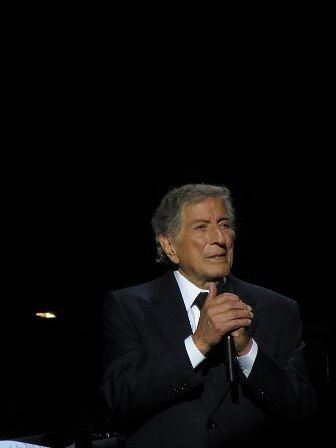Tony Bennett, the globally renowned singer whose voice embodied the American Songbook, has passed away. He was 96.
Bennett died in New York City on Friday morning, according to a spokesman for the singer. He was diagnosed with Alzheimer’s illness in 2016, yet that didn’t stop him from singing live or releasing new songs on occasion. He hit the Billboard Top 10 at the age of 95 in 2021 with his second duet album with Lady Gaga, Love For Sale, and retired the same year with two emotional performances at Radio City Music Hall.
Bennett burst onto the scene in the 1950s as a sophisticated crooner and rapidly established himself as one of radio’s most successful hit-makers. He was a performer with a nightclub sense. He carried that identity with him everywhere. It was like his cut suits: age suitable yet remaining ageless stylish.
He cut his first sides when he was 20 years old, including “St. James Infirmary Blues,” which he recorded with a US Army band in Germany soon after WWII.
The world knew him as Tony Bennett, a moniker bestowed upon him by Bob Hope. But he was born Anthony Dominick Benedetto in the Queens neighbourhood of Astoria, New York. His father died when he was ten years old. He eventually dropped out of high school and worked various jobs to support his family.
“I became a singing waiter in Astoria, Long Island,” Bennett told WHYY’s Fresh Air in 1998, “and it was the only job where I said, ‘If I have to do this for the rest of my life, I’d be happy doing that.’”
Bennett also said in same interview that music was a family affair that began in Italy with his father, who enchanted his village with opera. “In Calabria,” the singer said, “he had a reputation for singing on the top of the mountain.” The whole valley would hear it, and everyone adored him.”
On the G.I. bill, Bennett studied opera, especially the skill of bel canto singing. He claims an instructor advised him to imitate the phrasing of instrumentalists in order to establish his own voice.
Bennett was signed to Columbia Records in 1950 when his demo of “The Boulevard Of Broken Dreams” reached producer Mitch Miller. He quickly sold millions of albums, and a 10-year run of successes followed.
Bennett rose to prominence as a singer, but he adored jazz. He wasn’t convinced he could do it.
“He always says, ‘I’m not a jazz singer,’ but he has a great feel for a beat,” Ralph Sharon, Bennett’s accompanist and arranger for over 50 years, told NPR in 1998. Bennett’s jazz sensibilities was admired by the likes of Duke Ellington and Miles Davis, according to Sharon. “I think that’s why musicians enjoy playing with Tony and listening to him,” Sharon said.
Bennett wanted to sing with them since he enjoyed listening to them. His mainstream popularity enabled him to make jazz recordings with Art Blakey and the Count Basie Orchestra.
Sharon believes that no matter what style Bennett put on, one thing was clear: “I think it definitely is and was an identifiable sound.” “I believe you always suspected it was him.”
Bennett’s career got off in 1962 with the song “I Left My Heart In San Francisco.”
Sharon claims that the song that became Bennett’s hallmark came about by chance. Sharon discovered the sheet music, along with some clothing, in a drawer. He packed it before heading off.
“I always remember,” Sharon recalls, “we got to a place called Hot Springs, Arkansas, and I took this out of my bag, looked at it, and called Tony.” ‘You know what, we’re heading to San Francisco next,’ I remarked. “I said, ‘This is a song here that might be interesting.’”
That was far from the case. “I Left My Heart In San Francisco” became a worldwide smash, spending almost a year on the Billboard Hot 100 and earning Bennett two Grammy Awards.
Bennett used his celebrity to advocate for social concerns such as civil rights. Protesters trying to march from Selma to Montgomery, Alabama, were assaulted in 1965. The event was dubbed “Bloody Sunday.” As Bennett said on CNN in 2013, Harry Belafonte convinced Bennett to endure the bloodshed in the South and accompany him to Montgomery to play.
“I didn’t want to do it,” Bennett said to CNN, “but then he told me what happened — how some Blacks were burned.” They were torched when petrol was poured on them. I answered, ‘I’ll go with you,’ when I heard that.”
Bennett was aware of the changing times, yet he was hesitant to adapt his music. Bennett resisted singing rock, the new sound. Instead, he kept to classics, releasing two critically praised albums with jazz pianist Bill Evans. Bennett performed at smaller places and even appeared on television, including The Muppet Show, David Letterman, The Simpsons, and MTV.
In 1994, he performed on MTV Unplugged, with k.d. lang.
The success of the concert and CD paved the way for Bennett’s following 20 years, introducing his voice to a new audience. He went on to record duets with everyone from Stevie Wonder to Lady Gaga, who became his greatest admirer and ambassador to a plethora of new followers.
In 2011, he told NPR that music was his life and the key to his longevity.
“I love life,” he said. “I wish I could tell the entire world what a blessing it is to be alive.”
Tony Bennett lived his life by pursuing his hobbies, which included painting landscapes and portraits signed “Antonio Benedetto.”
More in Entertainment: https://buzzing.today/entertainment/
Photo Credits: https://commons.wikimedia.org/
